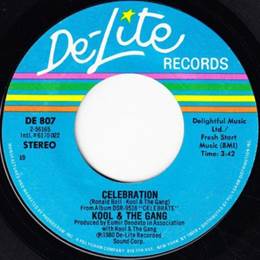I met Tom Eagleton 50 years ago during his first run for the Senate. I soon became aware that he had a passion for baseball. The short story: He was a St. Louis Cardinals fan. The long story: Below, in two posts from my baseball newsletter, the Hot Stove.
Hot Stove #88 – Originally Posted 11/30/18
Eagleton Source Material: I scoured the internet and Eagleton archives to cherry pick information about Tom Eagleton and baseball. There was a lot more than I thought I would find. Unless otherwise noted below, the italicized quotes are from Tom’s own words. For those who knew him, you will likely start hearing his distinctive raspy voice.
I also got background material from the 2011 biography Call me Tom by James Giglio. As the book title suggests, those who dealt with Senator Eagleton over a period of time were asked by him to please just call him Tom. That was hard to do for most of us who felt more natural calling him Senator, but as the years went by, it became comfortable to do what he said. So I will sometimes lapse into Tom in this post, but never to suggest any lack of respect. As you will see, Tom was slower to apply that rule for himself when it came to Gussie Busch.
The Cardinals and Young Tom Eagleton: Tom Eagleton grew up with the Cardinals. His father Mark was a fan at least since the Dizzy Dean/Gashouse Gang days in the 1930’s. The Cardinals were part of the family DNA.
“As we were growing up, the male Eagletons were fast eaters or ‘gulpers.’ My father and brother [Mark Jr.] would quickly finish their meals and head for the living room to discuss (or argue) one of the ‘matters of the day.’ I would catch up as quickly as I could. My father selected the subject matter, usually from the newspapers, e.g. world events and leaders, especially the threat of World War II; Cardinals baseball; bank robbers like John Dillinger and ‘Ma’ Barker; Ireland; politics…Frequently, we argued so much that without knowing it switched sides to keep the argument going. That is where I first became interested in politics.”
The Eagleton household purchased the weekly Sporting News, the national “Bible of Baseball” that was published in St. Louis. Below, from the front page on the Cards winning the 1934 World Series.
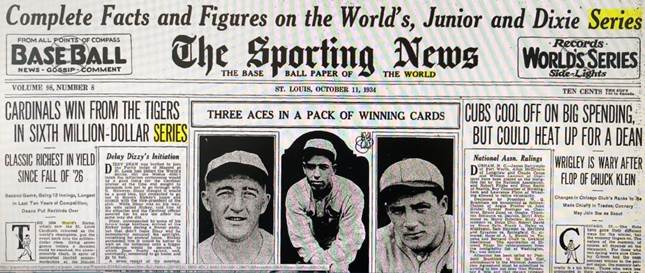
Starting in 1937, when young Tom would have been seven, the family annually went to spring training. The first year was in Daytona, and then St. Petersburg became the long-time spring home for the Cardinals. From 1943 to 1945, because of wartime travel restrictions, the team trained in Cairo, Illinois.
“Every spring, my father took Mark and me out of CDS for three weeks to go to the training camp of the St. Louis Cardinals…Mother was dragooned. She didn’t abhor baseball but she sure didn’t love it the way we did…Mark and I went to a private school until 12 noon, then a taxi took us all to the rickety old wooden Al Lang Field where the Cardinals played…We stayed with the Cardinal players at the decidedly unglamorous Bainbridge Hotel…In the evening, we would sit in front of the hotel and listen to the players talk. ‘Pepper’ Martin was our favorite. He was a comedian, a juggler, and a pseudo-dancer. At 7:00 p.m., we went to our room and studied until 9:30 p.m. under the tutelage of our mother. A bingo event was held one night a week. Howard Krist, a Cardinals relief pitcher, ran the event; I picked the balls out of the basket and announced the numbers – my first experience with public speaking.”
[Spring Training Stadium Trivia: The quote above refers to a rickety Al Lang Field, but Tom was likely referring to Waterfront Park which was demolished in 1947 and replaced at the same location by Al Lang Stadium.]
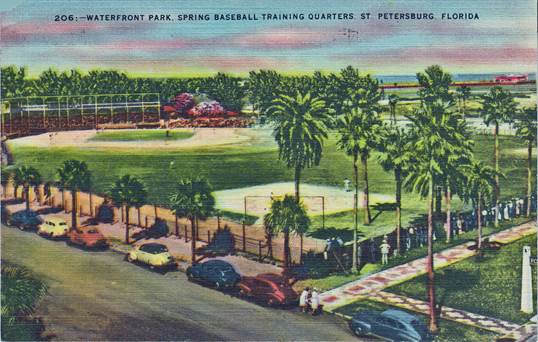
Branch Rickey was the general manager of the Cardinals from 1919 to 1942. He built the first major league farm system and made the Cardinals the class of the National League with the Gashouse Gang in the 1930’s and pennant winners in the 1940’s with players he developed before moving on to the Dodgers in 1943. Eagleton recalled Rickey from those spring training years:
“The players were ‘broker than broke.’ Branch Rickey, the general manager, strongly believed in the minimum wage for baseball players…Every spring training, Rickey gave a sermon at the biggest Protestant church in downtown St. Petersburg. Thrift was frequently interspersed in his remarks. Every player was ‘invited’ to attend. They all came and so did we. Rickey was a mesmerizing orator, with a great voice and a Clintonesque style of using scripture. He collapsed and died while giving a speech – for me, that’s the way to go.”
In the early 1940’s, Eagleton got a first look at future Hall of Famer Stan Musial. George Vecsey, in his bio Stan Musial: An American Life, has a Musial quote from 1976: “I’m a Democrat. Tom Eagleton, the Senator, tells me he remembers sitting in my lap when he was a kid visiting our spring training camp years ago.” Below, at spring training in 1942, Cardinal manager Billy Southworth and 21-year-old Stan Musial.
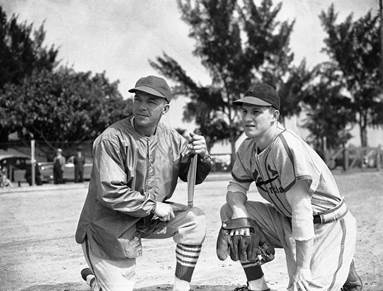
In high school, Tom played first base on the varsity team. As recounted in James Giglio’s bio, Tom was a “fine fielder, a mediocre hitter, and slow afoot…played on a dismal team…enjoyed the game more than anybody else on the field.” Tom quipped, “I could catch ground balls …about 50 percent of the time, if they were hit directly at me. My range was two feet either way. As a hitter, I could hit a slow pitch down the middle. Anything else was a pitiful swing and a miss.”
Tom was 17-years-old when former Cardinals GM Branch Rickey integrated major league baseball in 1947.
“I recall the first season that Jackie Robinson broke in with the Brooklyn Dodgers and played in St. Louis. The biggest racist on the baseball Cardinals was Enos ‘Country’ Slaughter, the enormously popular right fielder. In one game, I saw Slaughter running to second base, but instead of sliding into the bag, he flew through the air trying to spike Robinson in his ankles. One could feel the tension and anxiety of the moment.”
“Every summer we drove to our second home in Douglas, Michigan…Our black cook went with us and my dad had to call…AAA…to find which gasoline stations would allow blacks to use the restrooms. I also remember going to ball games at old Sportsman’s Park where blacks were allowed to sit only in the right field ‘pavilion’ behind a screen. As a youngster, I simply accepted all of this as part of American life. As I matured, I began to realize the horrors of segregation.”
[Jim Crow Trivia: Mark Eagleton’s call to AAA had a parallel for African-Americans who were “traveling while black” and wanted to have a “vacation without aggravation.” First published in 1936, The Negro Motorist Green Book listed hotels, vacation venues, restaurants, filling stations and other businesses where African-Americans were accepted as customers. The book was not limited to the south – it had entries for all states. This is the subject of the new movie Green Book. More on that below in Lonnie’s Jukebox.]
Gussie Busch and the Cardinals: Anheuser-Busch has roots in St. Louis going back to 1852. August A. “Gussie” Busch, Jr. joined the family business during Prohibition when “near beer” was barely keeping the brewery alive. An early indication of his sales genius came from a gift he gave his father in celebration of the end of Prohibition in 1933 – a grand beer wagon drawn by a team of Clydesdales. Realizing the potential for promotion, the Clydesdales were taken around the country, including a trip down Pennsylvania Avenue to deliver a case of Budweiser to President Roosevelt at the White House (below). Gussie became president of the company in 1946.
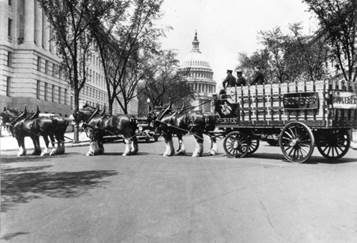
Tom Eagleton’s father Mark and Gussie Busch were friends, and Anheuser-Busch became a client of Mark Eagleton’s law firm. That work was later expanded to include the Cardinals after the company purchased the team in 1953. The prior owner Fred Saigh had been indicted on income tax evasion charges and needed to sell the team. Busch convinced the company to buy the Cardinals – both as a way to market the company beer products and as a civic gesture to keep the team in St. Louis. The company also bought Sportsman’s Park from the St. Louis Browns. Busch soon changed the park’s name to Busch Stadium and added a neon Anheuser-Busch eagle with flapping wings to the scoreboard.
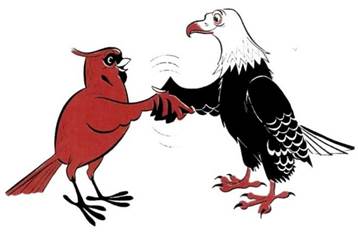
Coincidentally, Mark Eagleton had already given a helping hand to the Cardinals. Two years before Busch bought the team, Stan Musial convinced owner Fred Saigh to raise Musial’s salary to $75,000 for the 1951 season. The problem was that this was in potential violation of the anti-inflationary rules of the Wage Stabilization Board established for the Korean War. Saigh sought an exemption so he could pay Musial the full raise, but he was turned down. While an appeal was still pending in early 1952, Musial ran into Secretary of Labor Maurice Tobin at a baseball dinner in Boston. Baseball fan Tobin suggested that Musial bring his attorney with him to Washington to meet with Tobin and the Board. Musial did and got a favorable decision. The attorney he brought was Mark Eagleton.
The Cardinals and Integration: When Jackie Robinson arrived in 1947, many Cardinal players threatened to strike rather than play on the same field as Robinson. National League President Ford Frick took a hard stance and said he would suspend the players. The players backed down on the strike, but the team heard the message – there would be no black players in the Cardinal locker room. This was also a reflection of the city, then the southernmost franchise in the majors. Jackie Robinson told Roger Kahn in The Boys of Summer that he and fellow black players were jeered everywhere in the league, but nowhere worse than St. Louis.
In a New York Times article in 2009, sportswriter George Vecsey reminisced with Don Newcombe, a black teammate of Robinson on the Dodgers. Newcombe remembered being at a game in St. Louis in 1949 or 1950, and thousands of black fans were milling around the street, unable to pay their way into the game because the outfield pavilion, where blacks had been confined, was sold out. Supposedly, the stands had been legally integrated a few years earlier, but many of Robinson’s fans knew they were not welcome.
Newcombe recalled that “Jackie looked out and saw a bunch of people in the street with radios on” and summoned Burt Shotton, the Dodgers manager, who said, “I never saw anything like this.” The Cardinals were informed that the Dodgers would not take the field until the fans were inside. The Cardinals relented and pocketed extra money for the day. Newcombe: “We just wanted them to watch us play, not stand out in the street with radios.”
When Anheuser-Busch bought the team in 1953 and Gussie Busch found out there were no black players, he said, “How can it be the great American game if blacks can’t play.” He also knew that Budweiser was the top selling beer among black customers. Busch quickly went to work on the issue, and on opening day in 1954, the Cards had their first black player, starting first baseman Tom Alston.
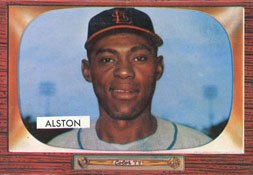
It took a while to trade for and develop black players, but the reputation for diversity grew and many greats ended up in St. Louis. Lou Brock, Bob Gibson, Curt Flood, Bill White and others were integral to the World Championships that followed.
Tom and Gussie: When Tom Eagleton graduated from Harvard Law School in 1954, he joined his father’s firm and soon found himself working regularly at the legal department at the brewery.
“Eventually I became, without a title, August A. Busch, Jr.’s assistant and sometimes lawyer. Mr. Busch, the head of the brewery, was popularly known as ‘Gussie,’ but even after I became a senator he was always ‘Mr. Busch’ to me out of great admiration and respect. Gussie was extraordinarily popular with his employees. He was a blue-collar-worker’s CEO. He had a gravelly voice, a short fuse and was a Knute Rockne/Casey Stengel, off-the-cuff speaker with the enthusiasm and persuasiveness of Lee Iacocca.”
Eagleton often traveled with Busch in the company’s private silver railroad car. Busch did not like to fly and so used the rail car to travel the country and give sales and pep talks to wholesalers. “Gussie always traveled with an entourage that included a sufficient number (four) to play ‘Gin and Honors’…I was selected for these trips, as a lawyer who could play a decent game of his Gussie-type gin rummy…lots of special rules and precedents – all of which were instantaneously promulgated by Busch over the years of gin rummy combat…In a given evening, he would announce a new rule – always in his favor. Arguments were loud, intense and often prolonged. The truth is, Busch loved the arguments as much as the game. It was all part of the combat of life in which winning beat the hell out of losing.”
Gin rummy continued through the years for Busch. Below, in 1969 before a baseball dinner, Busch is on the left with his chauffer holding his cards because Busch had a broken finger. The other gin player is Cardinal broadcaster Harry Caray. Another broadcaster, Jack Buck, is standing behind Caray.
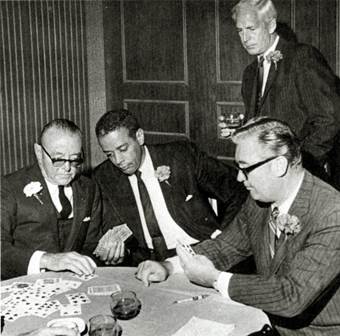
The trips on the train sometimes included Washington, DC, where “we were once joined for dinner by Majority Leader Senator Lyndon B. Johnson, House Speaker Sam Rayburn, Senator Stuart Symington, Congressman Dick Bolling of Kansas City, and Supreme Court Justice Tom Clark. Gussie did not go to them. They came to him.” Mark Eagleton had met Tom Clark on a couple of visits on President Truman’s yacht when Clark was in the famous poker games. Clark was a big baseball fan and attended some Cardinals spring training games with Mark and his sons. Tom had the opportunity to clerk for Justice Clark when he graduated from Harvard, but chose to return to St. Louis. Gussie’s politics had a practical side. Eagleton said Busch was a “repeal of Prohibition” Democrat.
“On one segment of our nationwide travels, a man named Bob Baskowitz joined us. Baskowitz sold all of the beer bottles to A-B. We rotated partners in this ‘gin and honors’ game. I won a hand with a ‘quick knock’ and got up to stand behind my partner, Baskowitz, and watch. He had three kings and threw one of them as a discard – an intentional mistake. He got up to go to the toilet and I followed him. I said ‘Mr. Baskowitz, you did a tank job…You are my partner. You can throw away your money to kiss Mr. Busch’s ass, but you cannot throw away my money.’ Baskowitz responded, ‘Tom, can’t you understand Gussie loves to win and I love to make him happy.’”
In Eagleton’s last train trip as a brewery lawyer, he won some money at the gin table. “As the trip ended, my fiancée, Barbara Smith, met me at the old Delmar station. Gussie came out, kissed her, and said ‘He’s rich. Make him buy you a big diamond ring.’ That was pretty much the end of my formal business association with a warm, wonderful friend, Gussie Busch, and of the first part of my political education. Soon, I would be ready to tip-toe into the world of real politics.”
Early Politics: When Tom was a boy having post-dinner discussions with his father about politics and baseball, Mark Eagleton was a Bull Moose Republican in the progressive style of Theodore Roosevelt. He was elected in 1937 to serve as a Republican member of the St. Louis Board of Education. He took his son Tom to the Republican Convention in 1940 where they met Wendell Willkie (the eventual nominee), Robert Taft and Thomas Dewey. The 11-year-old Tom was for Dewey “because he was handing out more buttons and horns and hats.” When the Republicans failed to re-nominate Willkie in 1944, Mark Eagleton left the party and supported Franklin Roosevelt. In 1946, he arranged for Tom, then in high school, to attend what became known as Winston Churchill’s “Iron Curtain” speech in Fulton, Missouri (photo below). Later in life, Tom said that “I always say the two best speakers I ever heard were [Branch] Rickey and Winston Churchill.”
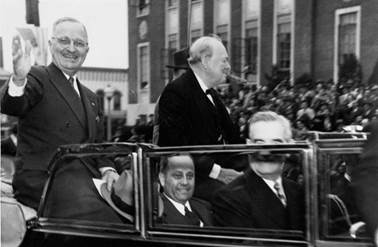
In 1953, Mark Eagleton was a candidate in the Democratic primary race for mayor. He lost.
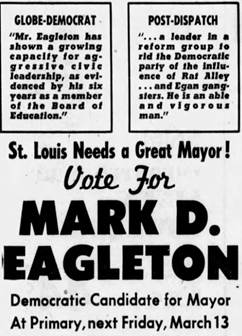
His son Tom never lost an election. At age 27 in 1956, Tom Eagleton was elected circuit attorney of St. Louis. In 1960, he ran statewide and became the youngest attorney general in the country.
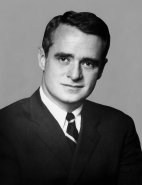
As AG, Tom was required by law to live in Jefferson City. This was not his favorite place, so he ran for Lt. Governor in 1964. He won and now could be based in St. Louis. The LG office had the additional advantage of being part-time. So he could again practice law, and I ran across a case that showed he did just that. And no surprise, the client was Gussie Busch who had been sued by Fred Saigh, the man who sold the Cardinals to Anheuser-Busch.
1964 – World Series: After Saigh served his prison time for tax evasion, he became a major holder of Anheuser-Busch stock. He was also a vocal critic of Gussie Busch as the leader of the Cardinals. During the 1964 season, Saigh claimed the team was demoralized. On August 16, with the Cardinals some 10 games behind the Phillies, Busch fired GM Bing Devine. On August 20, Saigh released a public letter offering to buy the team back. I’ll let Tom Eagleton tell the next part of this story (taken from his speech on the Senate floor in 1977 honoring Lou Brock’s career base-stealing record):
“As a Cardinals fan, I well remember the season of 1964. It was a year of triumph for the Cardinals, as they sneaked past the Philadelphia Phillies on the last day of the season to win the pennant, and then went on to defeat the New York Yankees in a thrilling seven-game World Series. It was a glorious October in St. Louis, but it might never have happened except for the events of the previous June. It was in June of 1964 that the Cardinals made one of the most controversial trades, a trade about which even General Manager Bing Devine had reservations. The deal saw the Cardinals trading their standout pitcher, Ernie Broglio, to the Chicago Cubs in exchange for an unproven young outfielder named Lou Brock.”
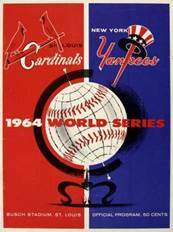
It was the first World Series win for the Cardinals in the Gussie Busch era. Fred Saigh’s offer to repurchase the team was, let’s say, untimely. But Saigh was not done with Gussie. He brought a claim as a company shareholder claiming that Gussie had been given favorable stock options that were unfair to other shareholders. The case went all the way to the Missouri Supreme Court, and Gussie won in a 1966 decision. The first two lawyers listed in the appeal as representing Gussie were Mark Eagleton and his son Tom.
1968 – The First Race for the Senate: By 1968, Eagleton was ready for the bigger stage of Washington, DC. – the U. S. Senate. Incumbent Ed Long had most of the Democratic establishment support, but was considered vulnerable. Another candidate, wealthy businessman True Davis, was also in the race. Some thought it was too early for Tom to make the jump.
“The closest I came to being talked out of it was when Gussie Busch called and asked if I could come to see him. I knew why. Mr. Busch was a great man. I had worked for him. In his gravelly voice, he asked me not to run: ‘Tom, I’m with Ed Long. You are smarter than him. I know that, but you are young. Symington can’t live forever and I promise I will support you when he runs out of gas, which can’t be all that far away.’” [As it played out, Stuart Symington won his fourth term in 1970 and so his seat was not open until 1976.]
“I paused for a while and then said ‘Mr. Busch, you know what I think of you…I simply have to move up or out of politics. I cannot bear another term of Lt. Governor. It’s close to a nothing job. If I run and lose, I am still at an age where I can have a new life practicing law or teaching or working with you again.’ He responded: ‘I knew your answer. I simply had to try. It will break my heart to be against you, but I will have to be. We are friends and if you win the primary, I will go all out for you.’”
I met Tom Eagleton during that 1968 campaign when he appeared as a speaker at our Young Democrats club. The YD club worked closely with the Committee for County Progress, a Jackson County reform organization that put together a ticket that won almost all county offices. The CCP also made a crucial endorsement of Eagleton in the hotly contested Senate primary race. The charismatic candidate became a favorite of our Young Democrats group. Eagleton won the close 3-way primary and moved on to the general election.
In October, Eagleton’s St. Louis Cardinals returned to the World Series. They had won the Series in 1967, but the Detroit Tigers took the 1968 title in an gripping seven-game series.
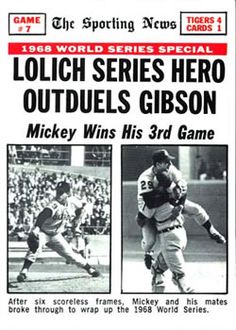
Eagleton had better luck than his Cardinals. In November, he won the general election and became a U. S. Senator at age 39.
Stay Tuned: My next post, Hot Stove #89, will feature more on Eagleton and baseball. Teasers: Stan Musial, Howard Cosell and the 1985 I-70 World Series starring Don Denkinger.
Lonnie’s Jukebox: In a long weekend before Thanksgiving, Rita and I binged on six Broadway shows in New York. Top of the list: To Kill a Mockingbird, written for the stage by Aaron Sorkin (West Wing, Moneyball, etc.) and starring Jeff Daniels as Atticus Finch. Next favorite: The New One, a one-man show by standup comedian Mike Birbiglia. Very funny. Network with Bryan Cranston is in previews – he was good, but some of the other actors need some more work before the official opening night.
In movie news, we just saw Green Book, a road trip film inspired by a true story. We give it two thumbs-up. Mahershala Ali plays an African-American piano virtuoso on a 1962 tour of the Midwest and Deep South. House of Cards fans will know Ali as the cool lobbyist Remy. He also won an Oscar for Moonlight. His driver/bodyguard for the trip is a streetwise Italian-American played by Viggo Mortensen. They often consult The Negro Motorist Green Book to determine where they will be welcome to eat and sleep on the road. Potential Oscar nominations for both actors. And for vintage car fans, a real feast.
For baseball fans, I want to give one more plug for Bohemian Rhapsody, the biopic on Queen. One of the most common anthems played between innings is Queen’s “We Will Rock You” – the one with the rhythmic two stomps and a clap, a call and response song that engages the crowd. After you see the movie, you will gain a new perspective for the next time you hear (and participate in) the song at a stadium. The movie has become a big hit. The box office gross is now over $150 million in the U. S. and approaching $500 million worldwide. Whether you see the movie or not, don’t miss the original 1985 concert footage from Live Aid, one of the biggest moments (well, 24 minutes) in rock ‘n’ roll history. Click here.
To finish this post, I looked for a song to go with the Cardinals win in the 1964 World Series. A natural choice might be to stick with Queen and play “We Are the Champions.” But Queen already has a lot of ink in this post and the song did not come out until 1977. So I’ll go with a record from 1964, the title of which describes what Cardinal fans were doing after their team beat the Yankees in Game 7. Click here.
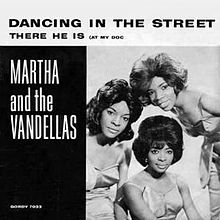
Hot Stove #89 – Originally Posted 12/10/18
The last post took us through 1968, the election of Tom Eagleton to his first term in the Senate. He quickly became a rising star in the Democratic Party, leading to…
1972 – McGovern and Baseball Commissioner: At the Democratic Convention in July of 1972, George McGovern picked Tom Eagleton to be his running mate. That did not go well, but it produced a couple of baseball stories that Tom liked to tell.
“My brief campaign for vice president was stressful and ultimately disappointing, but it did not lack for some happy moments along the way. I was asked… ‘If you don’t get to be vice president, what would you most like to do?’ I answered light-heartedly, ‘I would like to be the Commissioner of Baseball.’ Bowie Kuhn, Commissioner of Baseball, took me seriously and thought I was campaigning for his job. He called Gussie Busch…and said ‘Gussie, it looks like a showdown between me and that Eagleton. I want to fly out to St. Louis and talk with you.’ Busch thought Kuhn was a ‘quart low’ and told him not to waste his money on a plane ticket.”
“Then there was a wonderful kid in San Francisco…As we left to campaign in the morning, this young man stepped forward and said, ‘Senator Eagleton, sir, could I ask for your autograph – twice, if I may – one for me and one for my brother?’ I signed two blank cards. When we came back to the hotel…there was the same kid with the same question. I said, ‘I did this for you this morning.’ He responded, ‘Senator Eagleton, I have to tell you the truth. If I get four of you, I can trade them for a Willie Mays.’ I knew my stock was going up when just four of me could get a Willie Mays.”
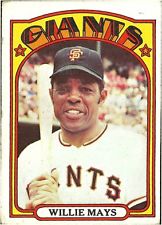
Eagleton’s race for vice president was over on August 1, just 19 days after it started, but Tom’s offhand remark about being commissioner lived on. When Kuhn stepped down in 1984, the MLB search committee wanted a person outside of baseball circles. Some of the names floated included Eagleton, Congressman Silvio Conte and Yale president Bart Giamatti. But Peter Ueberroth, leader of the 1984 Olympics, got the nod. Ueberroth left in 1989, and Eagleton and Giamatti’s names again surfaced. Giamatti thought Eagleton was lobbying for the job, but Tom sent Giamatti a letter to say he was not a candidate. Giamatti got the job, but died after being in office only 154 days. He banned Pete Rose from baseball just eight days before his death. Giamatti was succeeded by Fay Vincent.
1974 – The Second Race for the Senate: As the reelection race got underway in 1974, People Magazine’s cover proclaimed “Campaigning is Fun Again” for Tom Eagleton – certainly better than the 1972 McGovern campaign. The article in the magazine kept the commissioner rumor alive: “A lifelong St. Louis Cardinals baseball fan – Stan Musial is an honorary chairman of his campaign – he can conceive of only one career he might prefer to the United States Senate. ‘I could be a very happy commissioner of baseball’ he says. ‘But it would be a tough choice. I am very much at peace with myself and my profession.’”
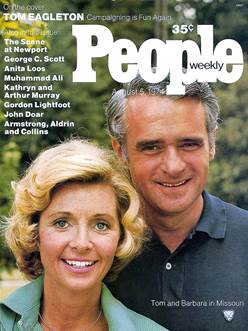
Musial’s honorary co-chair for the campaign was the usually nonpolitical former First Lady, Bess Truman. She said part of her incentive for accepting was the fact that Musial was her co-chair and she would have the chance to talk baseball with him. She was a loyal Royals fan and could recite the team’s starting lineup.
1974 – The Democratic Ticket: For me the big race in 1974 was Mike White for County Executive. I served as Mike’s campaign manager, and after he won the primary, I became Jackson County Democratic Chairman. The sitting County Executive, George Lehr, was running for state auditor, joining Eagleton in the only other statewide race. This put Mike and me in regular contact with Tom and his campaign staffers and forged several long-term friendships. It was pretty cool to have my name on the flyer with the man I met six years earlier in his first Senate race. The other candidate on the flyer is Congressman Richard Bolling who served KC in Congress from 1949 to 1983.
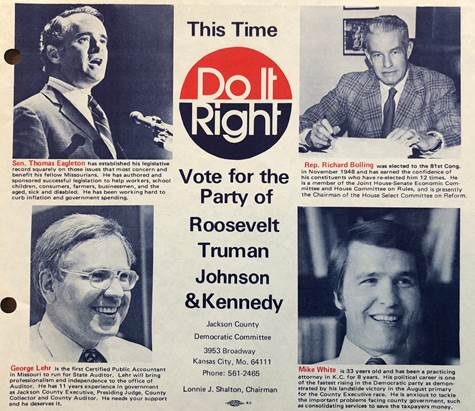
November had good news in my world. All of them won.
1976 ALCS – Eagleton and Cosell: Although Eagleton was a loyal Cardinals fan, he was also happy to say nice things about the Royals. As a wise politico, it was probably not lost on him that Royals fans also vote. In 1976, he got an opening to act on this.
The Royals played the Yankees in the ALCS. Part of the ABC broadcasting team was Howard Cosell, and his pro-Yankee coverage grated on those rooting for the Royals, notably Senator Tom Eagleton. So after the Yankees had won the series, Tom fired off a letter on Senate stationery to Roone Arledge, the head of ABC Sports. Tom knew of my baseball passion and so included me in his list of three to receive blind carbon copies. The others went to KC politico Steve Glorioso and Eagleton staffer Chris Clouser. And the letter was released to the press. Here is what he said:
Dear Mr. Arledge:
“I wish to add my name to the list of thousands in opposition to Howard Cosell’s broadcasting of the playoffs between the Kansas City Royals and the New York Yankees. I realize that Cosell’s obnoxiousness is the reason that ABC finds him so marketable. As a loyal, devoted baseball fan, I always have derived great comfort from the fact that our ‘nation’s pastime’ was free of Cosell. Hopefully, after the World Series that will be the case once again.
Reggie Jackson’s endless commentaries, although not as offensive as Cosell’s, were inane in their own right. He talks and talks saying next to nothing. Perhaps this was his way of keeping Cosell off the air.”
Yours very truly, Thomas F. Eagleton, Devoted Baseball Fan
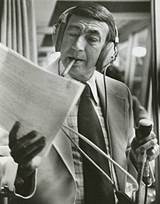
Cosell’s response was printed on October 22 in the Kansas City Times. Cosell expressed disdain for Eagleton’s criticism, calling Tom a johnny-come-lately to the ranks of Cosell critics. Cosell quoted Abraham Lincoln, “If I would read, much less answer, all the attacks on me, my shop would be closed to any business.” Cosell said he was flattered because Eagleton “is a member of the greatest legislative body in the world. However, he comes but lately to the arena.”
As you might guess, the scuffle with Cosell boosted Tom’s popularity in Kansas City.
1977 – Lou Brock: Ty Cobb finished his playing career in 1928 with a then-record 897 stolen bases. In 1977, the Cardinals Lou Brock broke Cobb’s 49-year-old record. This prompted Tom Eagleton to speak on the Senate floor about his hometown team’s hero. In part:
“As baseball fans all across the country know, it is not Brock’s outstanding batting record which…will assure him entry in baseball’s Hall of Fame. Rather, it is his record as a thief – specifically, as the most prolific stealer of bases in the history of the game…broke almost every base-stealing record on the books…most thefts in one season, 118 in 1974…most consecutive years stealing 50 or more, 12 years…”
The floor speech, which also covered Brock’s history with the team and his hitting prowess, was written by Eagleton staffer Steve Roling, then working in the DC office. Steve gave me more of the story:
“On the morning after Brock broke the record, the Senator asked me to write a brief speech to deliver on the Senate floor. Several weeks later, Lou Brock came to visit the Senator, and Eagleton invited me to join them in his office. The Senator told Brock that I wrote the speech. Many, many years later when I saw Lou Brock at a Negro Leagues Baseball Museum event in Kansas City, he immediately recognized me as the person who wrote the speech. He told me that this recognition by Senator Eagleton on the Senate floor was one of the highlights of his baseball career.”
1979 – On the Cover of the Rolling Stone (Baseball Edition): Steve Roling worked with press secretary Mark Abels to put together another Eagleton tribute when Lou Brock announced his retirement in 1979. This one made the cover of the Sporting News: “Senate Makes Lou Brock National Hero.” The article noted the many accolades coming in for Brock, but “perhaps the foremost citation” came from a resolution sponsored by Tom Eagleton and adopted by the Senate on September 4.
This was a memorable moment for Mark and Steve, who never expected their press release to take over the cover of the “Bible of Baseball.” It was a special treat for Tom Eagleton who started reading the Sporting News as a boy in his Cardinal-centric household. Eagleton also appeared with Brock and his family on the field at Busch Stadium on September 9 for “Lou Brock Day.” [How proud is Mark? He framed a copy of the cover and still has it. Removed it from the frame to send me the photo below.]
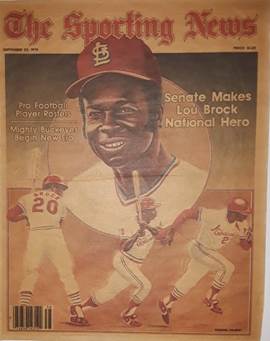
Stolen Base Update: Rickey Henderson beat Lou Brock’s season record of 118 by stealing 130 in 1982. In 1991, Henderson eclipsed Brock’s career record of 938 and continued stealing bases until retiring in 2003. Rickey’s final total was 1,406, a record that will never be broken.
1979 – A Personal Note: In 1979, I was on the receiving end of one of Tom’s well known tongue-in-cheek missives. Part of his regular routine was to review newspaper articles clipped by his staff. He sometimes then scribbled notes on them to mail out. He read a clipping about Mike White and me joining a new law firm and so shot off a note to me. He addressed it simply to “Shalton” (the man who said “call me Tom” usually referred to himself, friends and staff by last name only). It was a long “congratulatory” note that essentially said that our legal skills might be good enough to fix parking tickets for his staff. He signed off with “Good luck! You sure as hell will need some. Eagleton (Statesman).” I treasure this memento.
1980 – The Third Race for the Senate/George Brett Hits .390: Eagleton ran for his third term in 1980. Stan Musial was again an honorary chair and emceed the big campaign kickoff rally in St. Louis.
My role in his campaign was chairing the “Get Out the Vote” effort in Jackson County. I still have my four page memo summarizing the election day planning (phone banks, unions, rides, ballots, mailings, parades, etc. – total budget of $400). The memo was addressed to Eagleton staffers Woody Overton, Chris Clouser, Mike Kelley and Steve Roling.
We also had our eyes on something else. George Brett was still hitting over .400 in mid-September and finished the season at .390. Brett was the AL MVP and dramatically hit the homer off Goose Gossage that sank the Yankees in the ALCS – finally removing some of the sting after losing to the Yankees in the ALCS in 1976, 1977 and 1978. The Royals then met the Phillies in the World Series, losing four games to two.

Two weeks after the Series loss, we had the pleasure of toasting a victory, the reelection of Tom Eagleton to a third term in the Senate.
1982 – Beer and Baseball: In a Senate floor debate in July of 1982, Missouri Senators Eagleton and Danforth supported raising excise taxes on cigarettes. A tobacco-state Senator countered that maybe a raise should instead be made on beer, noting that Eagleton and Danforth represented the greatest brewery state. Gussie Busch would have been proud of his former protégé’s response. Eagleton: “Remember what made this country what it is today. Rednecks, white sox and Blue Ribbon beer. The whole world knows that beer is the ‘beverage of moderation.’ It is the mother’s milk of American Legion picnics, the sine qua non of a summer evening of professional baseball. With respect to my home city of St. Louis, we once proudly held the title: ‘First in booze, first in shoes and last in the American League.’ We lost our American League team; our shoes went to Taiwan and Korea. God, do not take from us our beer.”
1982 – Cardinals World Series: Being in Washington did not keep Eagleton from following his Cardinals. Frank Absher, a Cards broadcaster from 1979 to 1983, told Sports Illustrated that “Senator Tom Eagleton would tell us that when he was in Washington, there was an area [by the National Cathedral] where congressmen could pick up KMOX on their car radios to get Cardinals baseball.”
This would prove to be fun in 1982 as Tom’s Cardinals made it to the postseason for the first time since he ran for the Senate in 1968. After winning their division, the Cards beat the Atlanta Braves in the NLCS and headed for the World Series to play the Milwaukee Brewers. In the first six games, the Cards won three and Milwaukee’s “Harvey’s Wallbangers” won three (so named for manager Harvey Kuenn).
This is the stage where I got lucky. My good friend Woody Overton had gone to work in the Eagleton KC office in 1977. He called me to say he could get some Eagleton-sourced tickets if I could drop everything and ride over to St. Louis with him. Of course I did. We were joined at the game by Mike Ryan of Eagleton’s St. Louis staff. It was a good night to be at Busch Stadium. The Cards Joaquin Andujar pitched the victory backed by the hitting of Lonnie Smith and MVP Darrell Porter. Woody, Mike and I then celebrated at Balaban’s – more on that below in Lonnie’s Jukebox.
Below, Gussie Busch at the 1982 Series. His foam finger reads “We’re Red Hot with Whitey!” – as in Whitey Herzog. Whitey managed the Royals from 1975 to 1979 and the Cards from 1980 to 1990.
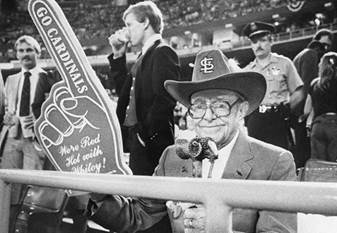
1983 – I-95 World Series – Commissioner’s Box: Although Tom never became baseball commissioner, he did once sit in the commissioner’s box. It was in 1983 at the “I-95” World Series between the Orioles and the Phillies. As recounted to me by Tom’s Chief of Staff Ed Quick, Ed and Tom attended the Series as guests of Bowie Kuhn who was attending his last series as commissioner. Also in the box was Hall of Famer Monte Irvin who worked in Kuhn’s office. I doubt Tom repeated his 1972 quip about the commissioner’s job, “I think to get paid $100,000 a year to attend baseball games is a job I’d really like.”
1985 – I-70 World Series – All Missouri: Statewide politicians in Missouri had a dilemma in 1985. The Cardinals and Royals met in the World Series. Who to favor? How to walk the tightrope? Eagleton had already announced that he was not running for reelection, and so could pick sides and not worry about the voting public. But he played diplomat, at least publically.
He introduced a resolution on the Senate floor to say the I-70 World Series demonstrated “that the very best baseball in the world is played in two areas of the country – eastern and western Missouri…has not been better placed since 1944 when the St. Louis Browns faced the St. Louis Cardinals…What do you do when the team of your ancestors, the Cardinals, plays Cinderella, the Royals? You pray, that’s what.”
Luckily for me, I was able to attend all seven games of the Series. After the Royals lost the first two in KC, I headed to St. Louis with Rich and Mary Ellison. (Before you ask, Rita was working and could not go.) Woody Overton gave us a heads-up where he would be eating before Game 3 as part of the Eagleton entourage. We went to the same restaurant on the Hill and Woody made sure we got to exchange pleasantries with Tom.
What I remember most about Game 3 (other than the Royals victory) was the pre-game when the outfield gates opened and Gussie Busch came riding in on a wagon drawn by the Clydesdales. Gussie also threw out the first pitch that night. The next night, Rachel Robinson (as in Jackie) threw out the first pitch. The Cards won to take a commanding three games to one lead. For Game 5, the ceremonial first pitch was delivered by Senator Tom Eagleton. The Royals won, but the Cards still led the Series, three games to two..
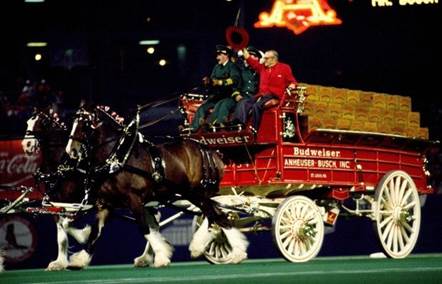
The teams returned to Kansas City for Game 6 and maybe Game 7. Game 6 will be forever remembered for Don Denkinger’s bad call at first base (discussed in detail in Hot Stove #79; click here if you need a refresher). After the Royals won Game 6, I’m guessing that Tom Eagleton was prompted to send out several of his famous handwritten notes to friends to castigate Denkinger. I can find no evidence that he made any public comment, but I asked Mark Abels about Tom’s take on Denkinger. His response:
“I suppose Tom thought it unbecoming the office to rail publicly at Denkinger after the ’85 Series, but he was not shy about sharing an opinion in private conversation, especially if the person was a friend from Kansas City. He had the famous picture of Todd Worrell, ball in outstretched glove and foot firmly on the bag with Orta still half a step away, hanging on a wall in his home.”
How bad was the call? Look at the Royals fans below. They are not standing and screaming for the runner to make it on a close play. They already knew he was out. Denkinger’s arms are poised in anticipation of making his infamous safe call.
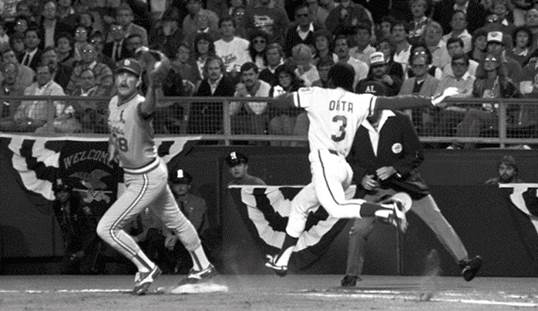
Game 7 was anticlimactic as the Royals trounced the Cards 11-0 to win their first World Series. Whitey Herzog and Joaquin Andujar were ejected from the game, a much different result than their Game 7 in 1982.
White House and Congress Celebration: The Royals headed to DC to receive congratulations from President Reagan and Congress. [Note that Vice President George H. W. Bush is at the far left in the photo.]
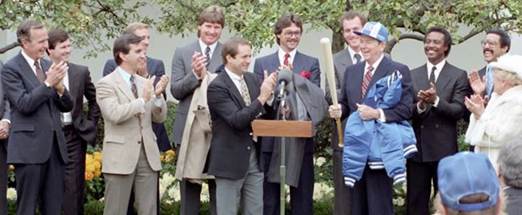
Senator Eagleton and his Senate colleagues from Kansas and Missouri held a reception for the team in the Senate caucus room. Also hosting was Congressman Alan Wheat who in 1983 had replaced Dick Bolling as KC’s representative in the House.
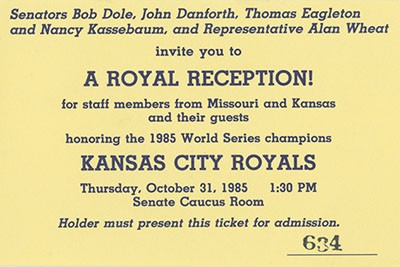
All four Senators spoke from the Senate floor to honor the team. Among Tom’s remarks:
“The 1985 Kansas City Royals are the stuff legends are made of, and indeed they have provided the grist for a new generation of half-time speeches, morale-boosting pep talks, and inspirational lectures. Instead of telling their players to “win one for the Gipper” [remember Reagan as Rockne?]…coaches can ask ‘Did the Royals give up in 1985?’ The ‘Miracle Mets’ of 1969 have been supplanted by the ‘Resurrection Royals’ of 1985 as the modern-day patron saint of all underdogs. Just as important…is how they did it. Rarely does one find a group with so many members possessed of talent, grace, style and humor.”
1986 – Eagleton and Casey (not Stengel): In Eagleton’s last year in the Senate, he served as the lead Democratic questioner in the Iran/Contra hearings. Many of the accused were convicted or awaiting trial when they were pardoned in 1992 by outgoing President George H. W. Bush. Eagleton formulated a baseball analogy on why one of the suspects never got indicted:
“CIA Director William Casey avoided any criminal embarrassment by dying before the indictments were handed down. Casey never could have been indicted for perjury before the Senate Intelligence Committee. True to his name, he talked like Casey Stengel, mumbled his words and talked in circles. When asked to clarify an answer, he expanded the circles in different directions. In baseball parlance, he went from first to third, to right field, to the pitcher’s mound and ended up in the on-deck circle.”
After the Senate: Eagleton chose not to run in 1986 and so ended his Senate career after three terms. He returned home to St. Louis to teach, write, practice law and see the Cardinals at Busch Stadium.
Tom was often seen around town dining with many of his former staffers and friends like Stan Musial and Jack Danforth. His connection with Musial began when Tom was a boy attending spring training with his parents. As with so many Cardinals fans, Musial became Tom’s favorite Cardinal player of all time. They also became close friends and political allies.
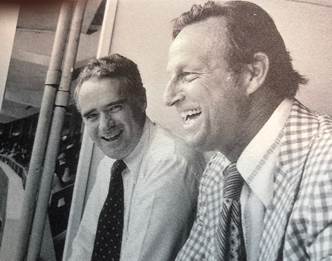
Tom’s former Senate colleague Jack Danforth was not a political ally (i.e., Republican), but they were still great friends. Danforth: “We remained close until Tom’s death. We went to Cardinals games together, and had lunch at what Tom called his ‘club,’ Beffa’s on Olive Street. To the end, we disagreed about politics. To the end, we were friends.”
In retirement, Tom became a regular at Busch Stadium. From an interview in 1995: “I like the day games. That’s old-fashioned baseball. I’m there nearly every Sunday afternoon. I will be thrilled when the Cardinals once again play on grass.” [The stadium’s AstroTurf was replaced with natural grass the next year.]
He often went to games with former staffers. Mark Abels remembers attending many Cardinals and Royals games over the years with Tom, as well as trips to Chicago: “When Tom wanted to go to a game, he called the team and announced he was coming and would pick up his tickets at will call. Going to ball games was the one area in which he was pretty shameless about rank having its privileges…We made a couple of trips to Wrigley for games; in the 2003 playoff series against the Marlins we were there when Cubs fan Steve Bartman interfered with a pop fly and was blamed for ruining the Cubs chance to get to the World Series.”
Surprisingly, another person attending games with Tom was his short-term running mate George McGovern. Their mutual love for the Cardinals outweighed the old politics. Tom told this story:
“Years later McGovern stayed at our house when he came to see a Cardinals baseball game. He had grown up in South Dakota listening to Cardinals games on the radio. In those days St. Louis was the western-most and southern-most outpost of the major leagues, and the Cardinals had a huge following throughout the Great Plains. George and I sat together at the ball game in St. Louis. A parent sent his child over to us to sign his scorecard. The child said, ‘My dad says you are important . Would you sign my scorecard?’ We signed. Then he asked, ‘When did the two of you play for the Cardinals?’”
Along with all Cardinal and Cubs fans (and much of the nation), Tom enjoyed the 1998 season as Mark McGwire and Sammy Sosa chased the Roger Maris record of 61 homers. McGwire got to 62 first and went on to hit 70 for the season. In 2001, Barry Bonds broke that record with 73. The muscular record breakers would then take a fall as the steroids scandal unfolded. Eagleton reflected on the comparison to the greats of the past: “There were no steroids back then. Babe Ruth was a legitimate hero. He was not a juiced-up Mark McGwire or Barry Bonds of today.”
The Final Season: Tom’s final season to watch his Cardinals was 2006, and they came through for him. The Cards won their division, then the NLDS against the Padres and the NLCS against the Mets. This sent them to the World Series to play the Detroit Tigers. Tom’s friend Stan Musial threw out the first pitch for Game 5.
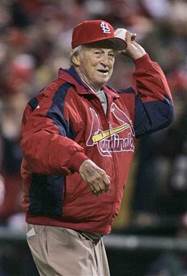
The Cardinals split the first two games in Detroit and then won three straight in St. Louis to win their tenth World Series Championship. [With another win in 2011, the Cards total is now 11, second only to the Yankees 27.]
Tom died on March 4, 2007, at age 77. The following month, on opening day at Busch Stadium, the Cardinals asked the crowd for a moment of silence to mark the recent deaths of three dignitaries: Tom Eagleton; Bowie Kuhn, the commissioner who worried that Tom would take his job; and Bing Devine, the general manager who traded for Lou Brock in 1964, got fired in mid-season, after which the Cardinals surged and won the World Series.
Jack Danforth gave one of the eulogies at Tom’s memorial service on March 10, 2007. Danforth imagined that the gregarious Eagleton was in heaven setting up banquets with friends to talk “politics and baseball.”
As befitted his style, Tom Eagleton had the last word at his memorial service. Those in attendance were given a written farewell message from Tom, commenting on his family members, his Senate career and the Catholic Church. He mentioned several Democratic colleagues from the Senate and also Jack Danforth. “You may wonder why I mention Jack Danforth. There is a possibility that God is a Republican, and at this point I feel it best to cover all my bases.”
His final words: “So go forth in love and peace – be kind to dogs – and vote Democratic.”
Also in that farewell message, Tom borrowed from baseball to summarize his life:
“Using Lou Gehrig’s famous quote, ‘I consider myself the luckiest man on the face of the earth.’”
Tom, I know I speak for many, we were certainly lucky to know you.
Lonnie’s Jukebox: After the Cardinals won Game 7 in 1982, Woody Overton, Mike Ryan and I celebrated at Balaban’s, a landmark bistro in the Central West End. Sitting at the bar, we kept hearing the same song replayed all night long. It was “Celebration” by Kool & The Gang, a #1 hit from 1981. A perfect match for the evening. Whenever I hear the song, I am transported back to St. Louis in 1982. And of course think of a smiling Woody Overton (RIP). Listen here.
